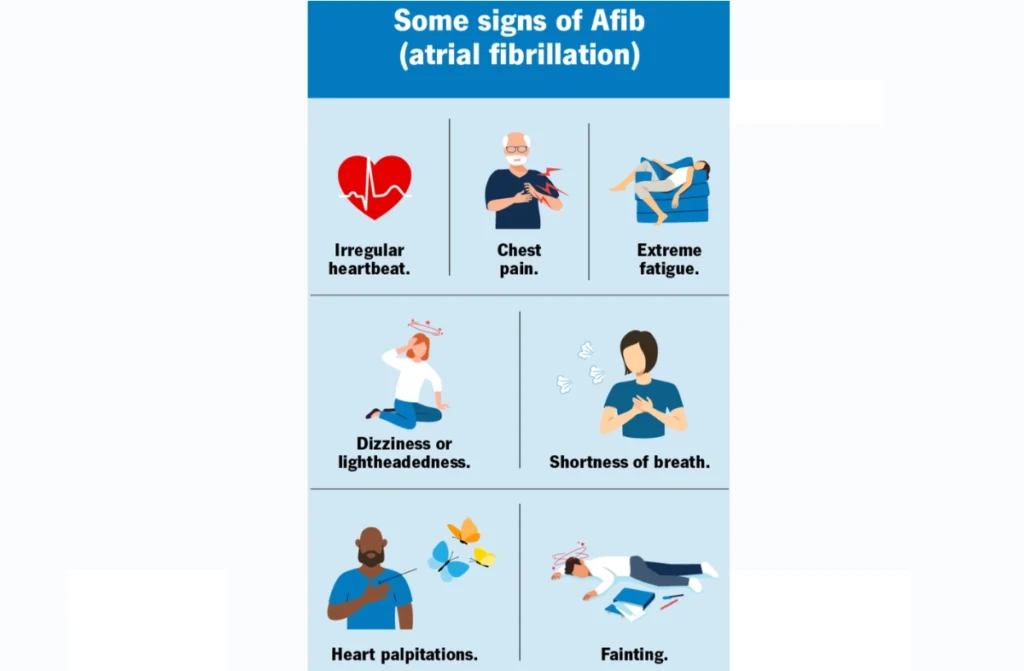Do you feel like your heart is skipping a beat? If so, you may be experiencing one of the many irregular heartbeat symptoms. Irregular heartbeat symptoms can vary in severity but can be a sign of an underlying condition that requires medical attention.
This blog post will cover everything you must know about irregular heartbeat symptoms, from the signs and causes to diagnosis and treatment options. With this information, you’ll be better equipped to make informed decisions about your health.
Irregular Heartbeat Symptoms
The most common symptoms of an irregular heartbeat, or arrhythmia, are skipped beats, extra beats, and a feeling that your heart is beating too fast or too slow. Other symptoms include palpitations, chest discomfort, dizziness, lightheadedness, and fainting. You may also experience shortness of breath, fatigue, or even anxiety.
If you see all of these symptoms, it is important to seek medical attention. A doctor will be able to diagnose an irregular heartbeat and start treatment. The most common form of irregular heartbeat treatment is medication. This can help regulate the heart rate and manage any underlying medical conditions causing the arrhythmia.
Other treatments such as lifestyle changes, electrical stimulation, and surgery may also be recommended depending on the individual’s condition.
Causes Of An Irregular Heartbeat
Irregular heartbeat symptoms, also known as arrhythmias, can be caused by a variety of factors. Sometimes, the cause is unknown and is not related to an underlying health condition.
However, in some cases, an irregular heartbeat can be linked to an underlying medical problem such as a heart valve defect, coronary artery disease, or an electrolyte imbalance. In addition, certain medications, alcohol, caffeine, and recreational drugs can all lead to an irregular heartbeat.
Regardless of the underlying cause, the goal of irregular heartbeat treatment is to restore normal heart rhythm and reduce symptoms. Treatment plans will depend on the type of arrhythmia present and may include lifestyle changes, medications, or a procedure called ablation. The most important thing to remember is that early detection and treatment are key in helping to prevent long-term complications associated with an irregular heartbeat.
How Is An Irregular Heartbeat Diagnosed?
To diagnose irregular heartbeat symptoms or arrhythmia, your doctor will first ask questions about your medical history and symptoms. You may be asked to describe when the irregular heartbeat began and how often it occurs. Your doctor may also check your pulse or listen to your heart with a stethoscope to detect any unusual rhythms.
If further testing is necessary, your doctor may order an electrocardiogram (ECG) or echocardiogram to check your heart’s electrical activity or structure. Depending on the results of these tests, your doctor may recommend other diagnostic tests such as a Holter monitor or a stress test.
Once the diagnosis has been made, your doctor will discuss treatment options with you. Irregular heartbeat treatment may include medications, lifestyle changes, surgery, or implantable devices. It is important to follow your doctor’s instructions closely and report any changes in your condition.
Are There Any Complications Associated With An Irregular Heartbeat?
Yes, there are potential complications associated with an irregular heartbeat, including stroke, heart failure, and even death. When an irregular heartbeat is left untreated, it can cause the heart to beat too slowly or too rapidly.
This may cause the heart to work harder than usual, leading to complications such as arrhythmias and heart palpitations. A weakened heart muscle due to an irregular heartbeat could also lead to heart failure and other cardiac events. If you experience any of these irregular heartbeat symptoms, it is important to seek medical attention immediately.
Fortunately, there are treatments available for irregular heartbeat. An irregular heartbeat treatment typically begins with lifestyle modifications such as reducing stress and avoiding alcohol and caffeine. Your doctor may also recommend medications or procedures like pacemakers or catheter ablation to help regulate your heartbeat. With proper treatment, you can reduce the risk of developing serious complications.

Irregular Heartbeat: Recognizing Risk Factors and Symptoms
Irregular heartbeat, or arrhythmia, can pose serious health risks and requires attention. Understanding the risk factors and symptoms is crucial for timely intervention:
Risk Factors
- Age: Elderly individuals are more susceptible.
- Heart Conditions: Existing heart diseases increase the risk.
- High Blood Pressure: Uncontrolled hypertension is a significant factor.
- Diabetes: Poorly managed diabetes contributes to arrhythmias.
Symptoms
- Palpitations: Feeling fluttering or pounding sensations.
- Fatigue: Unexplained tiredness can indicate irregular heartbeat.
Recognizing these signs allows for prompt medical evaluation and appropriate management.
Electrical cardioversion or ablation may also be used to normalize the rhythm. In more severe cases, a pacemaker or defibrillator may be necessary. Your doctor can determine the best course of treatment based on your specific needs.
Conclusion
This blog will give you the best idea of how to prevent irregular heartbeat symptoms and how it is diagnosed. Other additional information like symptoms and causes are also discussed in the blog. Just have a glance above and take better prevention to avoid irregular heartbeat. Health is wealth it should be taken care of.


